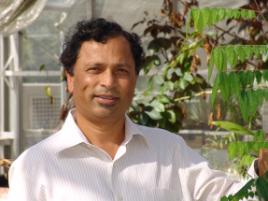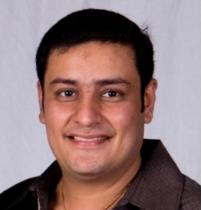Rocky landfill tips seed worldwide interest
Published on 27 November, 2008
CQUniversity researcher Nanjappa Ashwath and doctoral student Kartik Venkatraman* are gaining worldwide attention due to their forthcoming scientific article about putting a green cap on garbage dumps.
The article entitled 'Can phytocapping technique reduce methane emission from municipal landfills?' is being published in the next edition of the International Journal of Environmental Technology and Management.

Associate Professor Nanjappa Ashwath
It's already been previewed by EurekAlert and picked up by dozens of international news sites.
Associate Professor Ashwath and Mr Venkatraman based their article on trials of 'phytocapping' (placing a layer of top soil and growing dense vegetation on top of a landfill) at Rockhampton's Lakes Creek landfill.
They have received great support from Rockhampton Regional Council and Phytolink Aust Pty Ltd. Richard Yeates of Phytolink Aust Pty Ltd, Brisbane, has been instrumental in introducing phytoremediation technologies to Australia. He is striving hard to have the phytocapping technology accepted by the Environmental Protection Authorities. For this cause, he is actively involved in developing and running the ARC-supported (Australian Research Council) research projects in 5 different states.
According to EurekAlert, "the soil acts both as 'storage' and 'sponge' and the plants as 'bio-pumps' and 'rainfall interceptors'.
* Mr Venkatraman is studying part time - in the final thesis writing stage of his doctoral studies- and is now Coordinator Technical Services, Central Queensland Waste Management, for the Central Queensland Local Government Association. He recently presented a paper on Phytocapping at the 5th International Phytotechnologies Conference, Nanjing, China (October 22 - 25) and is attending this week's 2008 National Landfill Managers and Operators Conference at the Gold Coast, where he will be speaking about the Environmental Benefits of Phytocapping and its performance in a semi-arid climate.


